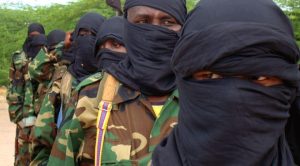Facebook Twitter (X) Instagram Somali Magazine - People's Magazine
Somali military forces have announced the killing of a senior Al-Shabaab leader during an operation in the southwestern city of Hudur. The army confirmed on Sunday that the militant, whose name was not released, held several key positions in the Al-Qaeda–linked group over the years. Most recently, he served as the group’s financial officer.
According to the army’s statement, the man was also accused of forcibly recruiting children into Al-Shabaab’s ranks, a practice the group has long been condemned for by human rights organisations. His death marks a significant blow to the militant network operating in the Hudur region.
The operation, conducted by Somali National Army (SNA) troops, also led to the dismantling of a network of Al-Shabaab operatives who were active in the area. These individuals were said to be involved in planning attacks and facilitating the group’s operations in southwestern Somalia.
The Somali army has been engaged in a prolonged battle against Al-Shabaab for well over a decade. The militant group has carried out numerous deadly attacks, targeting both civilians and security forces, and causing widespread destruction across the country. In recent years, the SNA—often working alongside regional and international allies—has intensified its campaign to push the group out of key territories.
Hudur, the capital of Bakool region, has long been a strategic target for both Somali government forces and Al-Shabaab. Control over this city offers a gateway to other parts of southwestern Somalia, making it a critical point in the fight against the militants. Officials say that by neutralising high-ranking leaders and disrupting their financial networks, the army aims to weaken the group’s ability to organise and fund operations.
This latest success in Hudur comes just days after the Somali Defence Ministry reported a major joint offensive in Lower Shabelle region. That week-long operation was carried out by the Somali National Army in partnership with the Uganda People’s Defence Forces under the African Union Transition Mission in Somalia (ATMIS).
According to the Defence Ministry, more than 100 Al-Shabaab militants were killed during the Lower Shabelle operation, with several others captured. Authorities said the mission targeted militant hideouts, supply routes, and training camps, effectively disrupting the group’s activities in the region. Weapons and other equipment were also seized during the raids.

Military officials believe the combination of targeted strikes on leadership figures and sustained ground offensives is gradually eroding Al-Shabaab’s influence. While the group still controls parts of rural Somalia, the army’s recent gains in Hudur, Lower Shabelle, and other strategic locations have put increasing pressure on its fighters.
The Somali government has repeatedly stated that defeating Al-Shabaab is essential to restoring peace and stability to the country. The group’s attacks over the past decade have killed hundreds of civilians and security personnel, displaced thousands of families, and disrupted economic activities in multiple regions.
In addition to military action, the government says it is working on measures to address the root causes of extremism, including improving education, creating job opportunities, and strengthening local governance. However, officials acknowledge that the fight against Al-Shabaab is far from over and will require continued support from both domestic and international partners.
For residents of Hudur and surrounding areas, the killing of the senior Al-Shabaab figure brings hope for increased security. Local leaders have welcomed the army’s efforts but are urging the government to maintain a presence in newly reclaimed areas to prevent the militants from regrouping.
With operations ongoing in various regions, the Somali military remains committed to dismantling Al-Shabaab’s networks, removing its leaders, and reclaiming territory under militant control. The success in Hudur is being viewed as an important step in that wider mission—a mission that, while challenging, is showing signs of progress.

